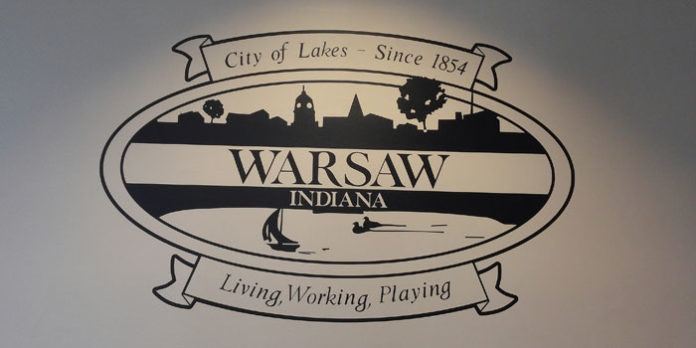One hundred thousand dollars will be taken from the city of Warsaw’s Economic Development Income Tax fund to provide loans of up to $10,000 to small businesses within the corporate limits.
Kosciusko Economic Development Corporation will administer the 0% interest loans, with businesses having up to 24 months to pay the loans back after a six-month deferment, the Warsaw Common Council approved Monday.
KEDCo CEO Alan Tio asked the city to participate in KEDCo’s countywide Small Business Relief Program, with Warsaw’s money going to small businesses within the city limits.
He reminded the council that he spoke to them about a month ago about KEDCo’s revolving loan fund that is already set up. Its fund has dollars to lend, a loan committee and a bank to process the loans.
“What we’ll talk about tonight is different from the discussion we had about a month or two ago. This is specific to putting funds together we can use either within the city of Warsaw specifically or throughout the county to help businesses with recovery and job retention,” Tio said, because of COVID-19 and the emergency orders.
He provided the council with suggested parameters of the program. Through the Kosciusko County Commissioners, Tio said KEDCo has applied for $250,000 in funding from the Office of Community and Rural Affairs to use within the framework of the Small Business Relief Program.
“Of course, we’ll looking for others who would like to add dollars to this program, like the city,” Tio said, adding that Monday night’s discussion was whether or not the city would like to participate.
The intent of the program is to provide small businesses affected by the COVID-19 pandemic and the governor’s emergency orders with relief and job retention and is targeted toward local businesses with 50 employees or fewer. Tio said the program may have multiple funding sources, from OCRA and private citizens and businesses. It would be up to KEDCo to keep those funding sources separate and KEDCo would work within the parameters each funding source requires.
“We think we see an opportunity and we want to make sure we step in and support local business owners,” Tio said.
Some of the council members are small business owners. Warsaw Mayor Joe Thallemer asked city attorney Scott Reust if those councilmen were planning to apply for the loans if they should abstain. Reust said they should abstain from talking and voting due to having a conflict of interest. Councilwoman Cindy Dobbins said she would abstain and did not comment or vote, while Councilman Mike Klondaris, who came late into the meeting, did speak on the loans but abstained from voting.
Thallemer said other communities have done things like this. Many communities in the state are looking at these loans as ways to help smaller companies that don’t have any other resources.
“In presenting this to you, I feel as this should not be looked at as being a grant but a zero or low-interest loan. These funds would come from EDIT to spur economic development. I would expect these funds to be repaid over a one- or two-year period,” Thallemer said, to help businesses with the COVID-19 pandemic impact.
Councilwoman Diane Quance expressed concern about the possibility of businesses piling up loans. Tio said the committee would review each application to see how they could best help each business.
“I’m not sure I would disqualify somebody if they’ve applied and gotten a loan, but I don’t want to pile on, too,” Council President Jack Wilhite said.
Thallemer asked the council for their thoughts on capping the loans. If the city made available $100,000, that could fund 10 loans at $10,000. He said he talked to other cities that had amounts in that ballpark and they were taken advantage of and seemed to work for that “size of business.”
“These funds are intended as emergency relief. They are strictly related to COVID-related hardships due to restrictions,” Thallemer said.
The council discussed various caps for the program – $5,000 or $7,500 or $10,000 – but eventually decided on an amount not to exceed $10,000.
Council members also discussed how long a borrower should have to pay the loan back and how soon they should start paying it back. Councilman Jeff Grose said he would favor six months to a year for the borrower to begin paying it back, with the council settling on six months.
Klondaris asked what would happen if a loan was given to a business but it went out of business. Thallemer said the city then wouldn’t get paid back. Tio said the city would have to decide if the loans would be secured or unsecured. Thallemer said if they did more loans at smaller amounts, maybe that would prevent more of a loss to the EDIT fund. Wilhite questioned if they capped it lower, are they doing all the good they can. Thallemer said maybe they could do a pilot program to see.
Grose said he’d like to consider relying on the judgment of the committee established for the loans. He reminded the council it’s $100,000, which is a lot of money, but the “business of America is small business” and he’d like the city to throw out a life preserver for as many as it cans. He said he’d like to be more aggressive than reserved.
Klondaris said he’d like the city to help more businesses than 10 at $10,000 each.
Grose said the council could revisit the program in four to six weeks and see if they want to go a round two.
Councilman Jerry Frush said $10,000 might scare smaller businesses away who only need $2,000 to $3,000 for what they need to do. Thallemer said it is a cap, but agreed with him on the idea.
Klondaris said the city wants to help small businesses with 15 or less employees. “We don’t want to end up with a ghost town,” he said.
After about an hour of discussion, Thallemer summarized the council’s consensus. He said the city would make $100,000 available for the first round of money from the EDIT fund, with each loan not to exceed $10,000 at 0% interest with the first payment not due until after 180 days and 24 months to pay it back after that. Quance made that into a motion, which was approved 5-0, with Klondaris and Dobbins abstaining.
Thallemer said he’ll take the terms to the Board of Works with a memorandum of understanding that it will be funded through EDIT. Funds will be made available to KEDCo for their use in their emergency relief funds, with stipulations that the city’s money is limited to up to $10,000 per applicant and for use within the city limits, as well as the other parameters approved by the council.
Thallemer said the city will keep a good close watch on it.
He asked for a consensus as to when the loan program would end. Wilhite said he’d go until year end. Quance said she’s still leaning toward end of year, and Frush agreed.
Quance made a motion to approve taking applications until the funds are depleted or until Dec. 31, and that motion was approved.
Thallemer said the pandemic will have an impact on the city’s businesses for some time and hopefully the loan program will have an impact to help those businesses.





